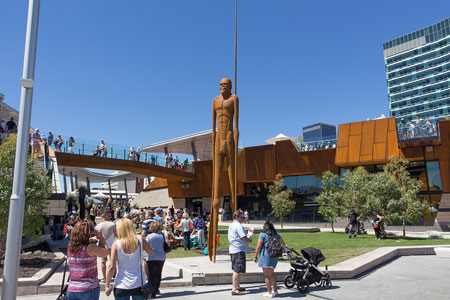City of Fremantle Hungarian Translation Services
Perth Translation Services » Perth » City of Fremantle Translation Services » City of Fremantle Hungarian Translation Service
City of Fremantle Hungarian Translation Services
Get fast and professional translation services in City of Fremantle. Our Hungarian translators provide translation of all types of documents. These include confidential legal, financial and migration document translations.
Upload Document For Translation

City of Fremantle
The City of Fremantle is a local government area in the south of Perth, Western Australia. The City covers an area of 19.0 square kilometres (7.3 sq mi), and lies about 19 kilometres (12 mi) southwest of the Perth central business district.
City of Fremantle History
In 1848 a town trust was formed comprising a chairman and a committee of five. For the next twenty-three years they set about constructing roads and many fine public buildings with the use of convict labour. By 1870 the population of Fremantle had reached 3,796 and was a moderately flourishing town. There was a move among the colonists to secure greater control of the management of their affairs and in 1871 the Fremantle Town Council was formed, with a chairman and nine councillors. Two of the major achievements of the town council were a reliable supply of pure water and a more efficient system of sanitation. By 1928 Fremantle had a population of 22,340 and an annual revenue of £73,354 - enough to warrant a claim for city status. City status was conferred upon Fremantle on the 3 June 1929 as a centenary honour in 1929.
North Fremantle, originally part of Fremantle, broke away in October 1895 to become an independent municipality. The first mayor of North Fremantle was Daniel Keen Congdon. The two municipalities were reunited by an order of the Governor in Executive Council as from 1 November 1961.
City of Fremantle Suburbs
Beaconsfield, Fremantle, Hilton, North Fremantle, O'Connor, Samson, South Fremantle, White Gum ValleyAbout the Hungarian Language
Hungarian is a Finno-Ugric language, which is a member of the Uralic language family. The group of Finno-Ugric languages also includes Finnish, Estonian, Lappic (Sámi) and some other languages spoken in the Russian Federation. Out of these it is Khanty and Mansi that are the most closely related to Hungarian. The Hungarian name for the language is magyar.
The traditional view holds that the Hungarian language diverged from its Ugric relatives in the first half of the 1st millennium BC, in western Siberia east of the southern Urals. The Hungarians gradually changed their lifestyle from being settled hunters to being nomadic pastoralists, probably as a result of early contacts with Iranian (Scythians and Sarmatians) or Turkic nomads. In Hungarian, Iranian loanwords date back to the time immediately following the breakup of Ugric and probably span well over a millennium. Among these include tehén ‘cow’ (cf. Avestan dhaénu); tíz ‘ten’ (cf. Avestan dasa); tej ‘milk’ (cf. Persian dáje ‘wet nurse’); and nád ‘reed’ (from late Middle Iranian; cf. Middle Persian nāy).
Archaeological evidence from present day southern Bashkortostan confirms the existence of Hungarian settlements between the Volga River and the Ural Mountains. The Onogurs (and Bulgars) later had a great influence on the language, especially between the 5th and 9th centuries. This layer of Turkic loans is large and varied (e.g. szó "word", from Turkic; and daru "crane", from the related Permic languages), and includes words borrowed from Oghur Turkic; e.g. borjú "calf" (cf. Chuvash păru, părăv vs. Turkish buzağı); dél ‘noon; south’ (cf. Chuvash tĕl vs. Turkish dial. düš). Many words related to agriculture, state administration and even family relationships show evidence of such backgrounds. Hungarian syntax and grammar were not influenced in a similarly dramatic way over these three centuries.
After the arrival of the Hungarians in the Carpathian Basin, the language came into contact with a variety of speech communities, among them Slavic, Turkic, and German. Turkic loans from this period come mainly from the Pechenegs and Cumanians, who settled in Hungary during the 12th and 13th centuries: e.g. koboz "cobza" (cf. Turkish kopuz ‘lute’); komondor "mop dog" (< *kumandur < Cuman). Hungarian borrowed many words from neighbouring Slavic languages: e.g. tégla ‘brick’; mák ‘poppy’; karácsony ‘Christmas’). These languages in turn borrowed words from Hungarian: e.g. Serbo-Croatian ašov from Hungarian ásó ‘spade’. About 1.6 percent of the Romanian lexicon is of Hungarian origin.
Recent studies support an origin of the Uralic languages, including early Hungarian, in eastern or central Siberia, somewhere between the Ob and Yenisei river or near the Sayan mountains in the Russian-Mongolian borderregion. A 2019 study based on genetics, archaeology and linguistics, found that early Uralic speakers arrived from the East, specific from eastern Siberia, to Europe. Today the language holds official status nationally in Hungary and regionally in Romania, Slovakia, Serbia, Austria and Slovenia.
City of Fremantle Hungarian Translator Services
Hungarian translator for certified translation services:
- Hungarian driving license translation
- Hungarian financial translation and bank statement translations
- Hungarian birth certificate translation
- Hungarian marriage certificate translation
- Hungarian name-change certificate translation
- Hungarian degree translation
- Hungarian diploma translation
- Hungarian school transcript translation
- Hungarian passport translation
- Hungarian police report translation
- Hungarian police check translation
- Hungarian personal letters and cards
- Hungarian utility bill translations
- Hungarian death certificate translation
Perth Translation provides fast and affordable Hungarian translation services in the City of Fremantle for all types of personal documents by NAATI translators.
Languages Translated
- Arabic translation service
- Czech translation service
- Chinese translation service
- Croatian translation service
- Danish translation service
- Dutch translation service
- French translation service
- Finnish translation service
- Greek translation service

